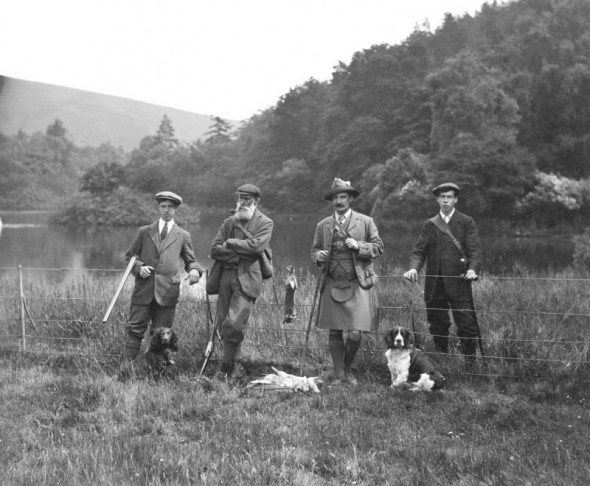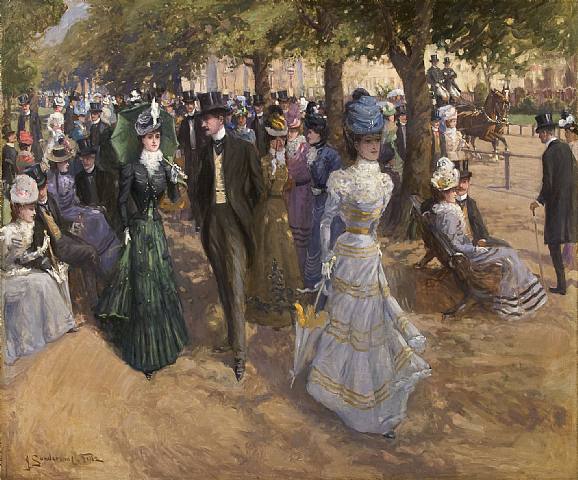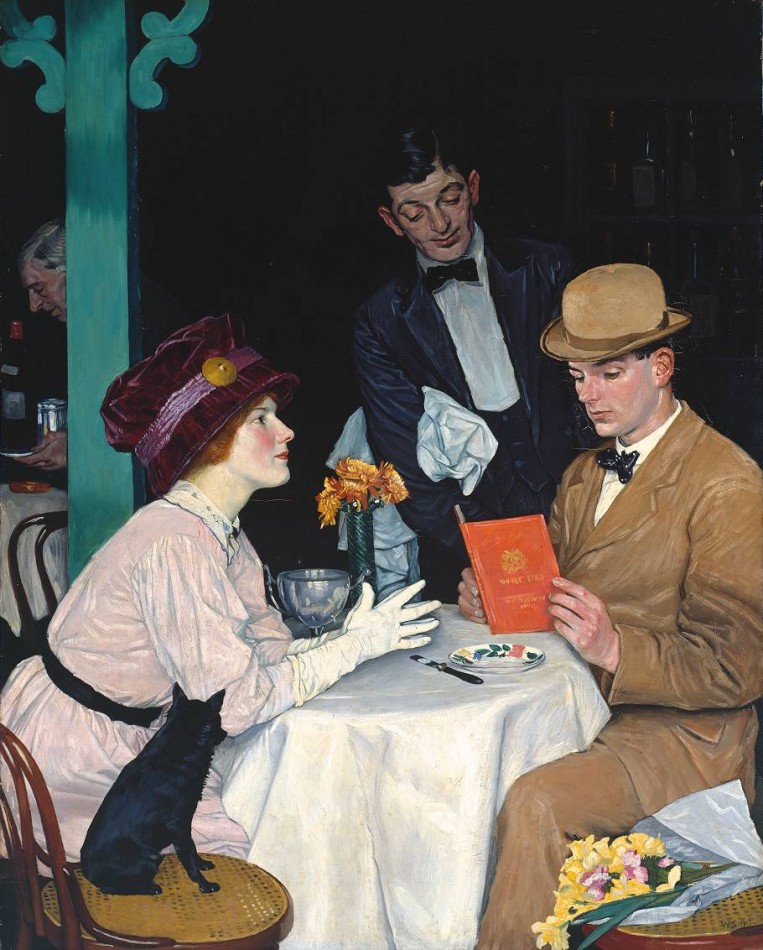
Disraeli, in his ” Lothair,” wrote of a visit to a country house that ” it is a series of meals mitigated by the new dresses of the ladies.”
Since his day there have been great changes in country house etiquette. In fact, the very word seems out of place, so free and easy are the manners and customs of this century in its early youth, as compared with those of the mid-Victorian period. The youth of both sexes behave with a sans-gene that would horrify their grandmothers, and would also startle their mothers if the latter were not well on the same road themselves.
However, the hostess is still allowed the privilege of inviting such guests as she may wish to have in her house, and she is still permitted to suggest the day when she can receive them, and mention that on which the visit may terminate. To such cool requests as: “Dear Mrs. Dash, – Could you put us up for a couple of nights next week, perhaps the 14th and 15th? It would be so sweet of you! ” she can find some excuse for replying in the negative. Such relief is still possible, but whether it will continue to be so for very long is another question. Things are marching at a great rate, and leaving the conventions far behind.
Modern Manners
The attitude of too many invited persons is that of conferring a favour by accepting an invitation to stay a week or so at a country house. It peeps out in the tone of the reply: “Thanks so much for your invitation. I am so sorry that I cannot accept it, but I am very busy in getting my new house shipshape. You will excuse me, I know.”
These were the exact words of a note of the kind written by a woman of good position. Not a word of thanks, and “excuse” quite in the wrong place. The regrets should have been expressed as though inability to accept the invitation was the writer’s loss. The thanks also might have been warmer. But the letter is typical of the bad manners of to-day.
The usual invitation runs as follows:
“My dear Mrs. Whyte, – Can you and Mr. Whyte spare us a few days next month? We should be so pleased if you could come to us on Monday, the 17th, and remain till the 24th. The Hunt Ball comes off on the 19th, and I know you are fond of dancing. Hoping you can come, and with kind regards to you both, believe me, very truly yours, – Constance Greene.”
The reply should not be delayed too long. The mistress of a country house has to plan out her relays of guests and fit in her friends so that all those she is anxious to have shall be included. Therefore, a delay in answering is not common politeness.
Letters Of Acceptance
In sending an acceptance it is usual, and convenient, to mention not only the day of arrival, but also the date of departure, that suggested in the invitation. This prevents any misconception on the point, such as arises occasionally from indistinct writing, the similarity between the figures 3 and 5, 7 and 9, etc.
If a refusal is sent, the regret expressed should be all for oneself, and a good reason should be given. A prior engagement is the usual one. It covers everything, and is therefore adequate. An inadequate excuse is a rudeness. It shows so clearly that the writer is declining for the simple reason that she Would rather stay away, and has trumped up some futile excuse for want of a real one.
In writing to accept any invitation the present tense, not the future, should be used.
It gives me great pleasure to accept,” not “It Will give me.” Acceptance is done in the present, though the visit itself is in the future. This is very frequently forgotten.
Apropos of the hunt ball, or any other amusement mentioned in an invitation, it would not be very polite to dwell enthusiastically upon one’s pleasant anticipation of it. To do so might suggest the idea that the invitation had been accepted rather on account of the ball than for the pleasure of staying with one’s host and hostess. This may be quite the state of the case, but good manners forbid it to be allowed to appear. Motors and Chauffeurs
On receiving an acceptance the hostess Writes again, expressing her pleasure at the news that her friends are coming, and giving them information about the trains, saying that the visitors will be met at whatever hour they may decide to arrive at the station. In wealthy circles, where many travel in their own motor, the capacity of the garage is referred to as adequate, or otherwise, to the accommodation of another. For instance:
“There will be room for your car between the dates mentioned, as the Greys leave us on the 16th, taking theirs with them.”
Or:
“I regret to say we shall not be able to put up your car. It is unfortunate, but our garage is limited in size, and the Marshes and Mallows will be here, and theirs quite fill it, added to our own. You can always have one of ours, however.”
A Wise Convention
In addition to valets and lady’s-maids, the upper-class hostess is now expected to house chauffeurs as well. Taking everything into consideration, a hostess is rather more like the manageress of a hotel than the owner of a private house during the visiting season. And the behaviour of her guests often goes far to confirm the impression. As often as not they give their address to their acquaintance without taking the trouble to mention the name of their host. Consequently replies arrive without the line “c/o So-and-so,” once considered imperatively necessary. It is an unpardonable omission, or would have been considered so not long ago, but it serves to show the trend of things. It is also a stupid omission, especially if the house should happen to be one of several grouped together. The name of the owner on the envelope ensures its punctual delivery. The name of the addressee is probably unknown in the district where he or she is only on a visit. There is a good, solid reason for many of the rules of politeness.
Breakfast at a big country house is a variable meal. Some of the guests have it in their bedrooms, and those who come downstairs for it do so at any hour they prefer. One hostess made herself very popular by putting on the little list hung in her guestrooms, among hours of letter delivery and collection:
” Breakfast before Luncheon.”
This list, by the way, is extremely useful. It gives the hours of meals, postal and telegraphic information, date of any entertainment about to take place in the neighbourhood, such as balls or theatricals, and any other items that the hostess may think likely to be useful.
A propos of this, a supply of notepaper bearing the address of the house, of blotting-paper, ink, pens, pencils, stamps, and telegram forms should be provided on a table in the bedroom.
Plans for the day are usually discussed at breakfast, and here again there is strong contrast between Victorian days and the present. The host or hostess used to suggest some plan that they had devised for giving pleasure to their visitors; but now, as often as not, the guests have mapped out their own day, and tell their entertainers what they think of doing. Sometimes it is more or less subtly suggested that the use of the motorcar for a few hours would be appreciated. There are women who know how to ” manage ” their hostess so cleverly as to make it appear that any such suggestion has come from her, not from themselves, even combating the offer when made with some appearance of vigour, though it is precisely what they had been leading up to all the time. But this ” management ” does not always make for future invitations.
Arranging the Dinner-table
The rigid rules of etiquette that once governed the allotment of places at the dinner-table are now replaced by many informal methods, except in the case of dinners to which guests are bidden in any numbers additional to the house-party. At these, and also on the first evening of a large party assembling, the rules of precedence are carefully followed. But afterwards there are many ways of varying the dinner partners. Not infrequently some of the guests themselves come to an understanding during the day as to whom they shall sit next. Sometimes lots are drawn. Sometimes the names of the men are written on slips of paper and put in a bag, and the women draw from it while it is half-closed, so that they cannot read the names; or, vice versa, the men draw the names of possible partners.
An Age of Easy Manners
The shopping plan is sometimes followed – firms with two names are chosen. The names are written separately and put in a bag. Who ever draws the name of one partner in the firm pairs off with the person who draws the other. In sporting houses the names of horses and owners are utilised after the same fashion.
A free and easy manner has become a characteristic of our highest class. The upper middle-class young man still jumps up to open the door for his hostess or any other lady, asks permission to smoke a cigarette in her presence, and conforms in other ways to the rules of ten years since.
Tips
The question of tipping servants arises at the end of a visit. Like all things, tips have increased in amount during the last fifteen years. Men-servants expect far more than in former years. There is now the host’s chauffeur, too, to reckon with, and his demands are not small. An extraordinary custom is permitted at a few country houses. On the day when a guest terminates a visit the men-servants are allowed to throw themselves in his or her way, and they have to be tipped.
On the other hand, it is the rule in some country houses to forbid tips. In such cases the hostess makes some special arrangement with her servants. Otherwise they would consider themselves ill-used, for tips amount to large sums in houses where constant relays of guests are entertained. The Tip Problem
The amount given as a tip depends on circumstances, and particularly on the position and social standing of the visitor. The following remarks apply to guests in the same set as their host, who is supposed to be a man of the wealthy upper classes. The butler will expect a sovereign for a few days’ visit. If there have been many motor-car rides, the chauffeur will expect from half a sovereign upwards. If he only meets the guest at the station and drives him back to it, five shillings or three half-crowns will do. This, too, will meet the case of a woman visitor. For a week-end visit she will give five shillings to the maid who looks after her room, half a crown to the footman or parlourmaid who carries down her luggage when she is leaving, and a similar amount to the coachman who drives her to the station. A chauffeur will expect more. If her luggage is sent on some other vehicle, she will find the driver of it waiting to be remembered.
For longer visits the tips would be in proportion to the length. A girl is not expected to give such liberal tips as her married friends. Married couples pay their tips separately, the man giving something to the butler, his wife to the parlourmaid and housemaid, sometimes to the housekeeper if she has to avail herself of her services in any way. Should a man-servant have valeted the husband, the latter should give him a tip.
At the conclusion of a ten-days’ visit to a house where there is no shooting, the money spent on tips sometimes amounts to five pounds.
— Every Woman’s Encyclopaedia



